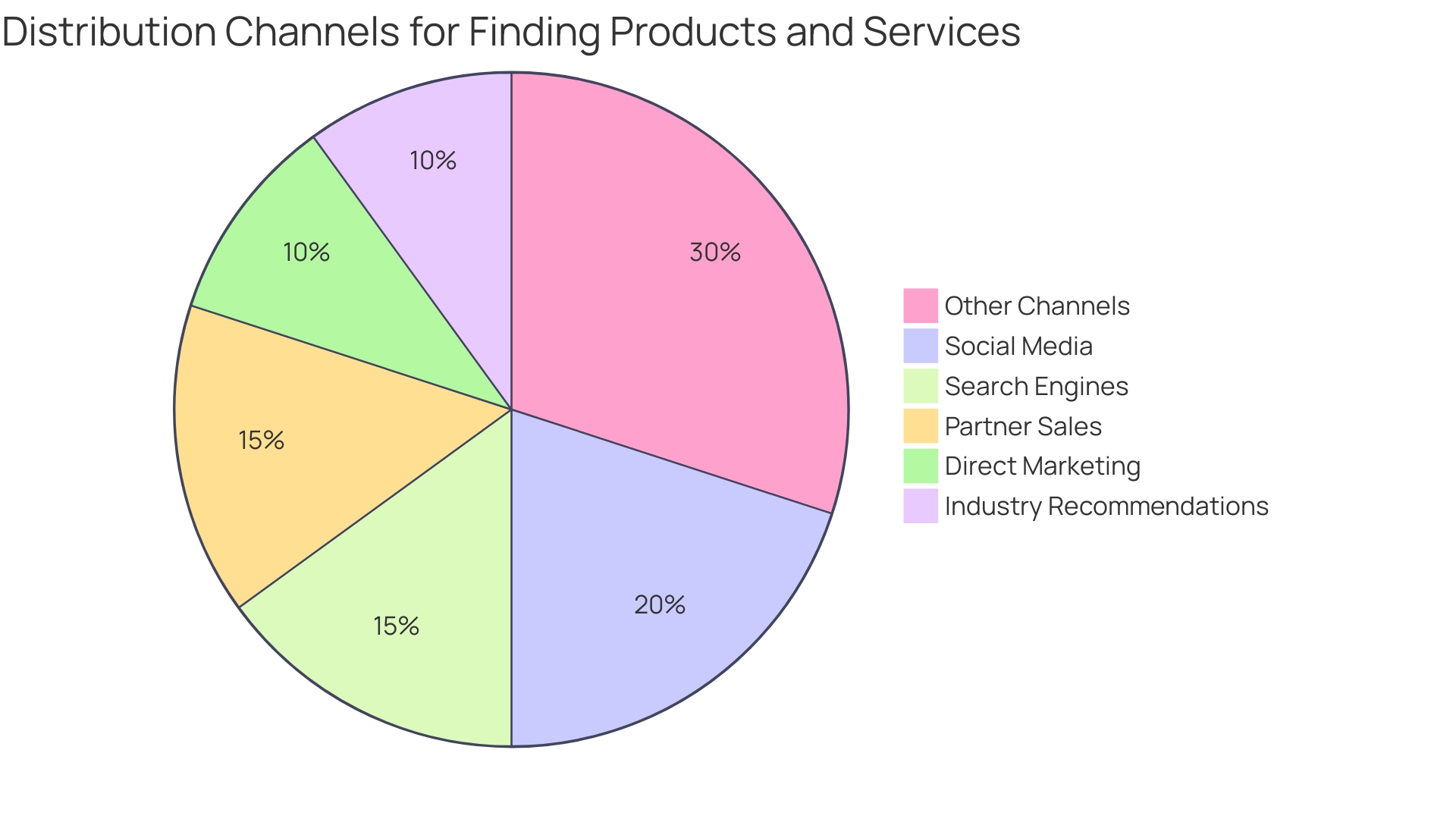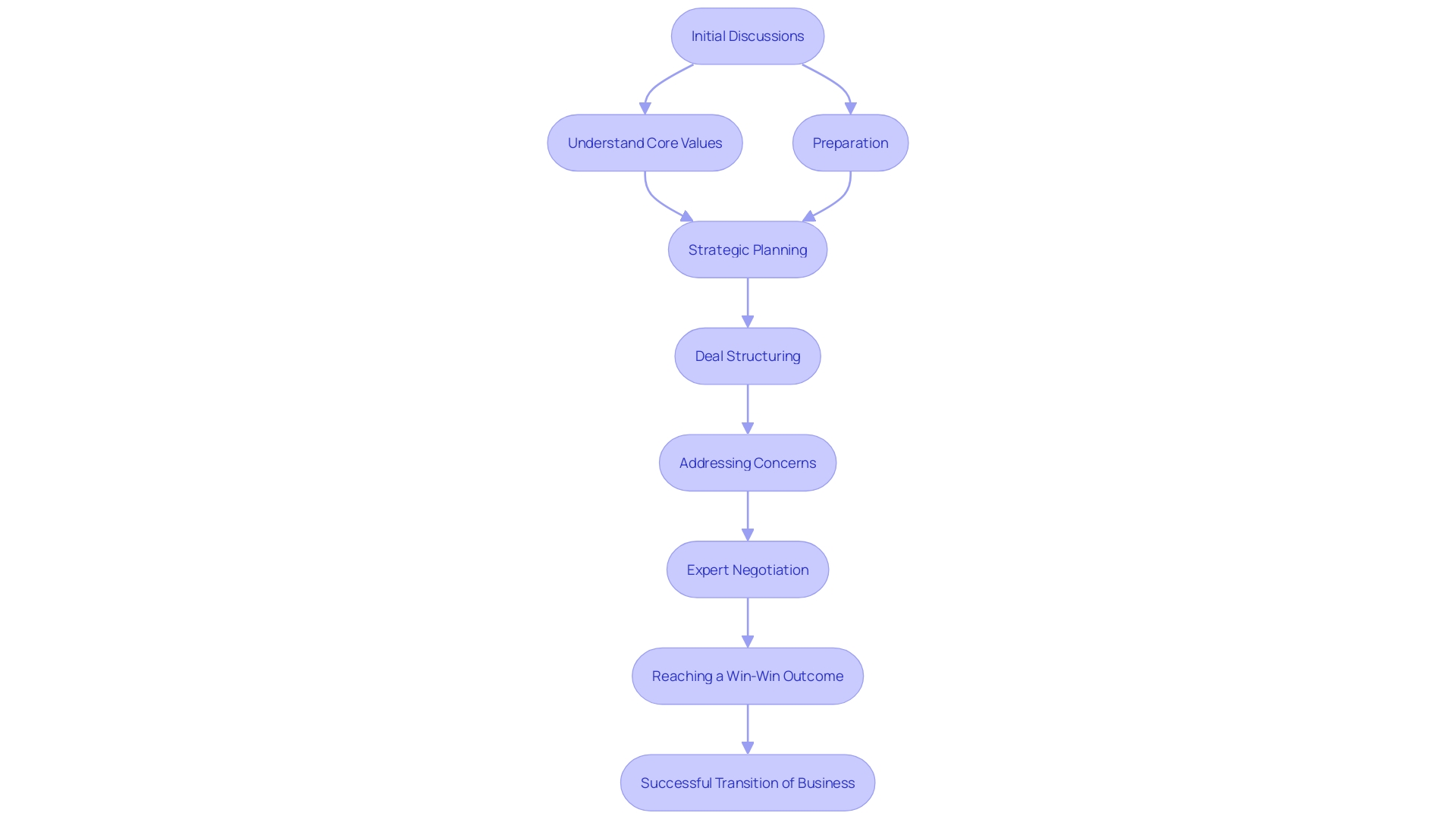Introduction
Navigating the complex terrain of buying or selling a business can be a daunting endeavor. Enter the business broker, a pivotal ally for entrepreneurs on this journey. These professionals are more than mere middlemen; they are seasoned navigators of the business market's intricate pathways, equipped with a profound comprehension of the nuances that dictate the course of business transactions.
In this article, we will explore the role of business brokers and the benefits they bring to the table for both buyers and sellers. We will also delve into the process of choosing the right broker, the steps involved in working with one, and the importance of business valuation expertise. Additionally, we will discuss key aspects such as marketing and advertising strategies, screening potential buyers, confidentiality management, negotiation facilitation, maximizing online presence, expanding networks, measuring and improving performance, common certifications and qualifications for brokers, specializations in business brokerage, and the costs associated with working with a business broker.
Join us as we uncover the valuable insights and guidance offered by business brokers, ensuring that the path to buying or selling a business is navigated with precision and care.
What is a Business Broker and What Do They Do?
Navigating the complex terrain of buying or selling a business can be a daunting endeavor. Enter the business broker, a pivotal ally for entrepreneurs on this journey. These professionals are more than mere middlemen; they are seasoned navigators of the business market's intricate pathways, equipped with a profound comprehension of the nuances that dictate the course of business transactions.
A case in point is the tailored support provided in the pursuit of Akiya properties, where a client's vision is transformed into a concrete quest for the ideal property, supported by meticulous service and expertise.
In the world of food and beverage, as exemplified by a branded hotel's restaurant in a bustling city center, the strategic insight of a business broker can lead to a swift increase in sales. This is achieved by astutely leveraging location and market knowledge to refurbish or open a restaurant, as underscored by industry expert John Young, who emphasizes the importance of understanding the market for success.
Moreover, the digital domain offers a plethora of resources for those seeking business opportunities. BizBuySell, for instance, stands as the largest online marketplace for businesses for sale, offering a wide array of options across price ranges and industries. It's a testament to the digital evolution of business brokerage, providing valuable tools such as the 'Business for Sale' feature and insightful resources like the 'BizBuySell Guide to Buying a Small Business.'
However, the decision to sell a business is not one to be taken lightly. It requires a strategic evaluation of the company's potential growth over the next decade, as advised by Abhijeet Kaldate of Astra WordPress Theme, and a thorough valuation comparing the business to others in the market, as recommended by Stephanie Wells of Formidable Forms.
Business brokers are not just strategic advisors; they are also guardians of value, skilled in risk management and technology, adhering to established policies and procedures to navigate tumultuous market conditions. Their role is critical, whether it's understanding industry trends, as emphasized by Season, or gaining insight into the perspectives of both buyers and sellers to facilitate a successful transaction.
In essence, a business broker's role transcends the transactional; it involves a partnership that carries both parties through the complexities of a life-changing deal. With a clear understanding of the market and a commitment to aligning with the client's interests, business brokers ensure that the path to buying or selling a business is navigated with precision and care.

Benefits of Using a Business Broker
Business brokers play a pivotal role in the transaction process for both buyers and sellers, offering a suite of services that facilitate successful business transfers. For sellers, engaging a broker means receiving a detailed valuation that reflects the true worth of their enterprise, akin to the careful assessment suggested by Abhijeet Kaldate and Stephanie Wells. Brokers leverage their expertise to identify and attract suitable buyers, crafting a marketing strategy that showcases the business's potential.
They act as the seller's advocate during negotiations, striving to secure a deal that aligns with the business's market value and the owner's expectations.
Buyers also reap significant advantages when collaborating with a business broker. With access to a diverse portfolio of businesses, including listings on platforms like BizBuySell, buyers are presented with opportunities that match their investment criteria. The broker's guidance is instrumental throughout the acquisition process, ensuring buyers understand each step, from initial selection to final purchase, much like the thorough explanation provided in Akiya property case studies.
Moreover, having a broker by their side means buyers have a skilled negotiator to rely on, one who will approach the transaction with a strategic mindset, as highlighted in the insights shared by John Young.
The real estate market's evolving dynamics, with shifting work patterns influencing buying habits, underscore the importance of expert brokerage services. As the market becomes more complex, the broker's role in advising clients, based on the latest industry statistics and trends, becomes increasingly valuable. Whether it's maximizing sale outcomes or navigating the intricacies of buyer-agent agreements, business brokers offer a comprehensive solution that aligns with the goals of both parties involved in the transaction.

How to Choose the Right Business Broker
Selecting a business broker is a pivotal decision that can significantly impact the outcome of your business transaction. Consider these essential aspects to guide you in making an informed choice:
-
Experience and Expertise: Seek out brokers who have a wealth of experience and have successfully facilitated transactions for businesses similar to yours. Their deep understanding of industry-specific challenges and opportunities is invaluable. For instance, ForexBrokers. Net highlights the importance of expertise by detailing their team's proficiency in assessing financial market intermediaries, underscoring how critical it is for a broker to possess a well-rounded knowledge base.
-
Reputation and References: Investigate the broker's standing within the industry. Ask for references and delve into their past client interactions. Reputable brokers, akin to those found on BizBuySell, the internet's largest marketplace for business sales, should boast a solid track record and positive client feedback.
-
Communication and Compatibility: The importance of clear and proactive communication cannot be overstated. Opt for a broker who is not only responsive but also one you find easy to collaborate with. This synergy was crucial in the Akiya purchase case study, where constant communication through video chats and questionnaires was key to understanding the client's needs.
-
Fees and Terms: Understand how the broker's fee structure aligns with the services they offer. It's imperative to compare various brokers to ensure you receive a fair deal, as highlighted by the range of services and costs discussed by ForexBrokers.net.
-
Licensing and Credentials: Verify the broker's licensure and any additional certifications they may hold. This step ensures that the broker adheres to professional ethics and industry standards, much like the brokers evaluated by ForexBrokers.net, who focus on what truly matters to clients.
By carefully considering these factors, you position yourself to find a business broker who not only meets but exceeds your expectations, facilitating a smoother and more profitable business transaction.
Steps Involved in Working with a Business Broker
Embarking on the sale of a business is a complex journey, and a business broker can be your invaluable ally along the way. The initial meeting is a chance to align on your objectives, where the broker learns about your business and lays out their approach. Valuing your business is next, and it's more than crunching numbers—it's a comprehensive evaluation of your company's fiscal health and market position to set a price that reflects its true worth.
Marketing is tailored to your business, targeting the right buyers through custom strategies and a robust network.
Screening buyers is a critical step, filtering for those with genuine interest and financial capability, thus streamlining the process. Negotiations are delicate dances, and your broker will lead, aiming to secure favorable terms for you. Finally, the due diligence phase is where claims are verified, and any concerns are addressed, followed by the closing, where your broker ensures all legal and financial protocols are followed for a successful transfer.
Each step is pivotal, designed to transition your business into the right hands while honoring its legacy and your hard work.
Business Valuation Expertise
A business broker's ability to accurately determine a company's value is paramount for setting a realistic price and achieving a successful sale. This process is multifaceted, involving a blend of financial acumen and strategic insight. By meticulously analyzing a company's financial health through its statements, cash flows, assets, and liabilities—alongside market trends and data—a broker can pinpoint the business's worth.
But it's not just about crunching numbers; understanding the nuances of the industry, assessing market leadership, and identifying growth prospects are equally crucial. Consider the guidance of experts like Reed Phillips, CEO of Oaklins DeSilva+Phillips, who underscores the intricate balance of art and science in valuation, suggesting the importance of qualitative factors such as market position and intellectual property. As the landscape of strategic mergers and acquisitions evolves, with a notable emphasis on selective deal pursuit due to valuation gaps, the expertise of business brokers has never been more essential.
Their role is to bridge these gaps, aligning seller expectations with market realities to facilitate transactions that reflect the true value of the business. In an environment where frequent acquirers are outperforming their peers, the insight offered by business brokers can be the linchpin for Main Street business owners looking to maximize their returns and make informed decisions in the competitive market.
Marketing and Advertising Your Business
To pique the interest of prospective buyers and ignite excitement around your business, a multi-faceted marketing approach is key. Expert business brokers employ a suite of strategies and promotional channels to effectively market businesses for sale. They craft engaging marketing materials that can range from detailed business profiles to compelling listings and persuasive presentations.
Leveraging their extensive network, they ensure your business is advertised on the right platforms, tapping into both traditional and digital realms. Utilizing tools like Google Analytics, Conversion Tracking, and Facebook Pixel, brokers can refine their marketing efforts, just as a hotel company increased its bookings through a similar strategic approach. The essence is to highlight what makes your business stand out, drawing in not just any buyers, but the right ones—those who see the true value of what you're offering.
In a crowded marketplace, it's not enough to just exist; businesses must be visible and appealing to their target audience. In-depth market research and a clear understanding of the advertising landscape are vital. With the global advertising market expected to grow significantly, and with an average person encountering thousands of ads daily, it's clear that a robust advertising strategy is indispensable.
Business brokers know that to capture the fleeting attention of consumers, who now have an average attention span of just 8 seconds, advertising must be creative and well-positioned.
The digital frontier is particularly crucial, as the majority of internet users are now accessing the web via mobile devices, and social media has become an integral part of people's daily routines. By tapping into these digital behaviors, brokers can maximize exposure and engagement. Just as strategic planning and revenue enhancement were crucial for a hotel company's success in a case study, they are equally important when marketing a business for sale.
A business broker's goal is to connect sellers with the most suitable buyers, creating a win-win scenario that benefits all parties involved.

Screening Potential Buyers
Thoroughly vetting potential buyers is a crucial aspect of the business sales process. Business brokers apply meticulous scrutiny to assess financial readiness and sincere interest in acquiring your establishment. Their review encompasses an examination of the buyer's financial health, credit status, and sector-specific expertise.
This diligent approach is not only a time-saver but also a filter to ensure that only earnest, financially capable prospects advance to the negotiation stage. It's akin to the meticulous market analysis and valuation processes that set the stage for success, much like the strategic location decisions made by retail chains or the careful selection of tenants to secure a consistent revenue stream. Business brokers operate akin to real estate experts who navigate the complexities of the market, ensuring that any transaction aligns with the true value of your business and the industry's trajectory.
Leveraging such expertise is paramount, as evidenced by the insights provided by BizBuySell, a leading online marketplace, that underscore the importance of a deep dive into niche markets to save time and enhance deal outcomes. Similarly, lenders echo the necessity for comprehensive knowledge and experience in the field, emphasizing the importance of a business's worth and profitability before approving loans for acquisition. In essence, engaging with a business broker parallels enlisting a top-tier real estate agent, ensuring that every step in selling your business is guided by skill, experience, and a strategic understanding of the market.
Confidentiality Management
When engaging in the delicate process of selling a business, the protection of sensitive information is non-negotiable. Business brokers are acutely aware of this imperative and are well-versed in ensuring that a business's confidential data remains shielded from premature exposure. Through the strategic employment of confidentiality agreements, they meticulously vet potential buyers to affirm their commitment to discretion.
Furthermore, the secure orchestration of information sharing prevents any untimely revelations that could potentially destabilize the business's standing or offer competitors an undue advantage. This meticulous approach was exemplified in the case of Non-stop dogwear, where rapid scaling and global expansion necessitated robust confidentiality measures to maintain their competitive edge. Moreover, the complex landscape of secondary sales, as highlighted in industry experiences, underscores the importance of a controlled flow of information to safeguard the financial interests of all parties involved.
In essence, the expertise of a business broker is not only in facilitating a sale but also in preserving the integrity and reputation of a business throughout the transaction process.
Negotiation Facilitation
The art of negotiation in a business sale goes beyond mere price discussions; it's a dance of diplomacy where business brokers shine as the choreographers. These adept negotiators don't just represent your interests; they are maestros at orchestrating the perfect harmony between what you seek and what the market offers. They excel in crafting deal structures that address the minutiae of concerns, ensuring that no stone is left unturned in the quest for a deal that resonates with both buyer and seller.
Experts like Ami Kassar, author of 'The Growth Dilemma', emphasize the importance of self-management in negotiations; brokers epitomize this principle by maintaining poise and control, steering negotiations towards a win-win outcome. Their expertise is backed by research, indicating that thorough preparation and understanding the client's core values are pivotal to a successful negotiation, leading to quicker sales cycles and higher close rates without excessive concessions.
With a keen eye on the evolving landscape of sales, where value trumps price, business brokers bring to the table a deep understanding of the transaction's nuances. As they demystify the complexities of the deal, both parties are poised to reach an agreement that reflects not just a transaction, but a mutual investment in success. The statistics from LLCBuddy reaffirm the impact of such strategic negotiations in the business world, highlighting the broker's role in the seamless formation and transition of businesses.

Maximizing Online Presence
Navigating the digital landscape is crucial for business brokers who are dedicated to showcasing businesses to prospective buyers. By leveraging the power of online platforms, they're able to enhance a business's visibility and attract the right audience. Brokers meticulously craft business listings, infusing them with targeted keywords that resonate with active searchers.
Their skill in creating compelling narratives around businesses for sale, combined with the strategic use of social media, casts a wider net to engage potential investors. Through this combination of digital fluency and marketing acumen, brokers not only elevate businesses in the digital realm but also connect them with buyers ready to embark on a new venture.

Expanding Your Network
Navigating the complex terrain of buying or selling a business requires more than just a sign in the window; it needs the expertise and connections of a seasoned business broker. These brokers come equipped with a vast network that spans various industries, and it's within these extensive connections that they can amplify the visibility of your business listing, helping it reach the eyes of potential buyers far and wide.
For instance, consider the dedicated work of a broker in the picturesque Chiba Prefecture, where an American client sought a peaceful Japanese countryside property. The broker's commitment to understanding the client's needs, backed by a structured questionnaire and video chats, led to a meticulous search through hundreds of properties. This level of personalized service illustrates how brokers use their networks to zero in on options that align perfectly with a buyer's or seller’s criteria.
Similar dedication is evident in the story of Alvaro, an entrepreneur who, with the help of Flippa's platform and its intelligent valuations engine, sold his online marketing agency for $155,000. A broker's success, much like Alvaro's, is often underpinned by a solid track record of transactions that speak to their credibility and expertise in the market.
A business broker's role is to share industry knowledge, offer an informed opinion of value, and leverage data about current market conditions. This strategic approach not only increases the chances of finding the right buyer but also positions your business advantageously in the competitive landscape. The success stories of brokers and platforms in the field serve as a testament to the power of a well-connected, informed professional in making your business aspirations a reality.
Measuring and Improving Performance
Business brokers are essential in navigating the complexities of selling a business, leveraging data analytics and strategic adjustments to enhance the marketing and sale process. They must be adept at monitoring key performance indicators (KPIs) that reflect the health and progress of a sale. For example, in the hotel industry, performance is often gauged by revenue, profit, and operational metrics, such as year-on-year revenue lift or RevPAR improvements.
Similarly, brokers track inquiries and engagement levels to determine the effectiveness of various strategies, akin to how a hotel might monitor bookings after implementing foundational advertising tools like Google Analytics and Conversion Tracking.
As highlighted by Peter Drucker's assertion, "If you can’t measure it, you can’t manage it," continuous measurement is vital. This philosophy underlines the importance of setting benchmarks and utilizing measurements to foster a culture of continuous improvement. By consistently assessing performance against these benchmarks, brokers can pinpoint areas for enhancement, streamline operations, and secure a successful sale.
Moreover, in the residential brokerage industry, the valuation process is uniquely tied to the production and retention of independent contractor sales agents, who are the primary assets of the firm. This underscores the need for a nuanced approach to data analysis and strategy optimization in the business brokerage field.
Additionally, understanding the value of one's business is paramount before entering into negotiations, as emphasized by experts who advise against neglecting proper valuation. A comprehensive appraisal involves analyzing financial statements, assets, customer base, and industry trends, which is precisely the kind of thorough evaluation that proactive business brokers undertake to ensure their clients receive a fair and lucrative deal.
In conclusion, business brokers serve as the linchpin in the sale process, applying rigorous data analysis and adaptive strategies to ensure the business is positioned attractively in the marketplace. Their ability to measure, analyze, and refine their approach is what ultimately elevates the chances of a successful and profitable sale.
Common Certifications and Qualifications for Business Brokers
Elevating their expertise and trustworthiness, business brokers can pursue various certifications and qualifications. Among these, the Certified Business Intermediary (CBI) stands out, a prestigious designation from the International Business Brokers Association (IBBA) that marks a broker's deep understanding and professionalism within the industry. Another noteworthy credential is the Certified Business Broker (CBB), awarded by the California Association of Business Brokers (CABB), which signifies a broker's dedication to ethical standards and specific educational achievements.
Not to be overlooked, the Accredited Business Intermediary (ABI) from the American Business Brokers Association (ABBA) is conferred upon brokers who exhibit substantial experience and knowledge in business brokerage. These certifications serve as indicators of a broker's commitment to maintaining high standards of education, experience, and professional conduct.
Specializations in Business Brokerage
When selecting a business broker to help sell your business or guide you in acquiring a new one, considering their area of specialization is crucial. Brokers often concentrate on particular sectors, offering them an in-depth understanding of the market nuances and specific challenges that come with each industry. For instance, a broker with a background in retail businesses will be well-versed in the seasonal trends and consumer behavior that can impact sales and valuation.
Similarly, those specializing in restaurants and food service are knowledgeable about health regulations, supplier relationships, and the importance of location.
Manufacturing and distribution brokers can navigate the complexities of supply chain management and operational efficiency, while service-based business brokers understand the intangibles that drive the success of such companies, including customer relationships and service quality. Franchise resales require a broker who is familiar with franchise laws and can evaluate the strength of the franchise brand, while e-commerce and online business brokers are adept at assessing digital footprints, online traffic, and the scalability of web-based operations.
Choosing a broker with the right specialization not only brings industry-specific insights but also grants access to a network of potential buyers and sellers in the field. For example, in the case of an Akiya property purchase in Chiba Prefecture, the broker's expertise in Japanese countryside properties and their understanding of the client's preferences were key to identifying suitable options.
Business consulting services, akin to specialized brokers, offer tailored advice and support to help you grow and develop your business. They can act as a coach, providing direction on various aspects of your business, from branding to streamlining core operations. The benefits of such services are manifold, as they can assist in building your brand or even help you find new talent to strengthen your team.
In an ever-evolving marketplace, understanding the latest trends and regulations is vital. For example, BizBuySell, the largest online marketplace for businesses for sale, offers a plethora of options across different industries, serving as a testament to the importance of staying informed and adapting to market dynamics. This approach is backed by the Global State of Business Analysis Report, which highlights the importance of understanding industry trends to navigate challenges effectively.
In conclusion, whether it's through the specialized knowledge of a business broker or the strategic guidance of a small business consulting service, leveraging the expertise of seasoned professionals can be a game-changer for business owners looking to buy, sell, or grow their ventures.
Costs of Working with a Business Broker
Understanding the financial implications of hiring a business broker is essential for any savvy business owner. The investment in a broker's expertise can significantly influence the successful sale of your business. Brokers often adopt a commission-based approach, typically charging between 5% to 10% of the sale price.
In some instances, a flat fee might be more applicable, particularly for straightforward transactions where the broker's involvement is more predictable. Moreover, some brokers require a retainer fee to offset initial costs, which is then usually subtracted from the final commission or flat fee upon the completion of the sale.
It's illustrative to consider real-world scenarios. For example, when engaging a broker for the purchase of an Akiya property, clients might pay an upfront fee, like ¥220,000, to initiate the search process. This fee contributes to the broker's time and resources spent in meticulously reviewing potential properties that fit the client's criteria.
Similarly, starting a real estate brokerage demands a thorough understanding of potential expenses. An industry expert with 28 years of experience emphasizes the importance of accurately estimating these expenses, whether they relate to licenses, certifications, or the operational costs of running the brokerage.
When contemplating the services of a business broker, it's advisable to perform a cash flow analysis. This will help you evaluate the costs against your business budget and consider any possible adjustments. Reflect on the words of Abhijeet Kaldate from Astra WordPress Theme, who stresses the importance of valuing your business for the future when considering an offer.
Furthermore, consider the advice of Mark Cuban, who underlines the necessity of preparation and understanding your industry before starting any business endeavor.
Ultimately, the cost of enlisting a broker should be weighed against the value they provide, their proficiency, and the anticipated return on investment. This strategic evaluation will guide you in making an informed decision that aligns with your business objectives and financial plans.
Conclusion
Business brokers are essential allies in the complex process of buying or selling a business. They provide detailed valuations for sellers and attract suitable buyers through tailored marketing strategies. Buyers benefit from brokers' access to diverse business portfolios and guidance throughout the acquisition process.
Choosing the right broker is crucial, considering factors such as experience, reputation, communication, fees, and credentials. Working with a broker involves steps like valuing the business, marketing, screening buyers, negotiation facilitation, confidentiality management, due diligence, and closing.
Valuation expertise is paramount for setting a realistic price and achieving a successful sale. Brokers analyze financial statements, market trends, and industry nuances to determine a company's worth accurately.
Maximizing online presence is crucial, and brokers use various strategies to enhance visibility and attract the right audience. Their extensive network helps connect buyers and sellers, amplifying the visibility of business listings. Specializations in different industries provide brokers with industry-specific insights.
Certifications and qualifications, like the Certified Business Intermediary (CBI) or Accredited Business Intermediary (ABI), demonstrate a broker's professionalism and expertise.
Understanding the costs associated with working with a broker is essential. Brokers typically charge a commission-based fee or a flat fee, ranging from 5% to 10% of the sale price.
In conclusion, business brokers are invaluable allies, providing expertise, guidance, and a network of connections. Their strategic approach ensures transactions are navigated with precision and care, increasing the chances of a successful outcome.




